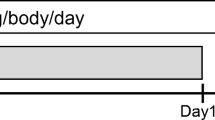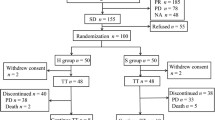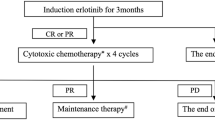Abstract
Purpose
Recent studies have demonstrated that erlotinib therapy may be considered an option for patients with advanced non-small-cell lung cancer who experienced disease progression after treatment with gefitinib, particularly in patients in whom the disease had been stabilized for a long time prior to gefitinib therapy. The aim of this study was to evaluate the disease control rate and toxicity of gefitinib in patients whose disease progressed after erlotinib therapy.
Methods
From May 2005 to August 2006, 15 patients received a 250 mg/day dosage of gefitinib after having disease progression while taking erlotinib at a dose of 150 mg/day.
Results
Among patients who received erlotinib, 1 (7%) achieved a partial response (PR), and 5 (33%) achieved stable disease (SD). Among patients who received gefitinib, none achieved a PR, and 6 achieved SD (40%). Five out of 6 patients who achieved PR/SD with erlotinib also achieved SD with gefitinib; 8 out of 9 patients who achieved a progressive disease (PD) with erlotinib also achieved a PD with gefitinib. The median time to progression (TTP) and overall survival (OS) were 2.3 and 3.5 months, respectively. The TTP and OS in SD patients were 3.7 and 7.4 months, respectively. The most common toxicities of gefitinib were dry skin (grade 1–2) in 27% of patients and acneiform rashes and rashes/desquamation in 20% of patients. Diarrhea (grade 1–2) occurred in 7% of patients.
Conclusions
Our data suggest that patients who achieved PR/SD with erlotinib also benefit from taking gefitinib. Conversely, gefitinib is not recommended in patients whose disease progressed after taking erlotinib.
Similar content being viewed by others
References
Jänne PA, Engelman JA, Johnson BE (2005) Epidermal growth factor receptor mutations in non-small-cell lung cancer: implications for treatment and tumor biology. J Clin Oncol 23:3227–3234
Baselga J, Arteaga CL (2005) Critical update and emerging trends in epidermal growth factor receptor targeting in cancer. J Clin Oncol 23:2445–2459
Thatcher N, Chang A, Parikh P et al (2005) Gefitinib plus best supportive care in previously treated patients with refractory advanced non-small-cell lung cancer: results from a randomised, placebo controlled, multicentre study (Iressa Survival Evaluation in Lung Cancer). Lancet 366:1527–1537
Mok TS, Wu YL, Thongprasert S et al (2009) Gefitinib or carboplatin-paclitaxel in pulmonary adenocarcinoma. N Engl J Med 361:947–957
Lee JS, Park K, Kim SW et al (2009) A randomised phase III study of gefitinib (IRESSA) versus standard chemotherapy (gemcitabine plus cisplatin) as a first-line treatment for never-smokers with advanced or metastatic adenocarcinoma of the lung. World Conference on Lung Cancer Proceedings 2009:PRS 4
Mitsudomi T, Morita S, Yatabe Y et al (2010) Gefitinib versus cisplatin plus docetaxel in patients with non-small-cell lung cancer harbouring mutations of the epidermal growth factor receptor (WJTOG3405): an open label, randomised phase 3 trial. Lancet Oncol 11:121–128
Maemondo M, Inoue A, Kobayashi K et al (2010) Gefitinib or chemotherapy for non-small-cell lung cancer with mutated EGFR. N Engl J Med 362:2380–2388
Shepherd FA, Rodrigues Pereira J et al (2005) Erlotinib in previously treated non-small-cell lung cancer. N Engl J Med 353:123–132
Bezjak A, Tu D, Seymour L et al (2006) Symptom improvement in lung cancer patients treated with erlotinib: quality of life analysis of the National Cancer Institute of Canada Clinical Trials Group Study BR.21. J Clin Oncol 24:3831–3837
Zhou C, Wu Y, Chen G et al (2010) Efficacy results from the randomise phase III OPTIMAL (CTONG 0802) study comparing first-line erlotinib versus carboplatin plus gemcitabine, in Chinese advanced non-small-cell lung cancer patients with EGFR activating mutations (abstract # LBA13). Ann Oncol 21 (Suppl 8):viii6
Rosell R, Gervais R, Vergnenegre A et al (2011) Erlotinib versus chemotherapy (CT) in advanced non-small cell lung cancer (NSCLC) patients (p) with epidermal growth factor receptor (EGFR) mutations: interim results of the European Erlotinib Versus Chemotherapy (EURTAC) phase III randomized trial. In: ASCO Annual Meeting Proceedings. Part I. vol 29, No. 15 (May 20 Suppl):7503
Togashi Y, Masago K, Fujita S et al (2011) Differences in adverse events between 250 mg daily gefitinib and 150 mg daily erlotinib in Japanese patients with non-small cell lung cancer. Lung Cancer 74(1):98–102
Baselga J, Rischin D, Ranson M et al (2002) Phase I safety, pharmacokinetic, and pharmacodynamic trial of ZD1839, a selective oral epidermal growth factor receptor tyrosine kinase inhibitor, inpatients with five selected solid tumor types. J Clin Oncol 20:4292–4302
Hidalgo M, Siu LL, Nemunaitis J et al (2001) Phase I and pharmacologic study of OSI-774, an epidermal growth factor receptor tyrosine kinase inhibitor, in patients with advanced solid malignancies. J Clin Oncol 19:3267–3279
Cho BC, Im CK, Park MS et al (2007) Phase II study of erlotinib in advanced non-small-cell lung cancer after failure of gefitinib. J Clin Oncol 25:2528–2533
Vasile E, Tibaldi C, Chella A et al (2008) Erlotinib after failure of gefitinib in patients with advanced non-small cell lung cancer previously responding to gefitinib. J Thorac Oncol 3:912–914
Lee DH, Kim SW, Suh C et al (2008) Phase II study of erlotinib as a salvage treatment for non-small-cell lung cancer patients after failure of gefitinib treatment. Ann Oncol 19:2039–2042
Wong AS, Soong R, Seah SB et al (2008) Evidence for disease control with erlotinib after gefitinib failure in typical gefitinib-sensitive Asian patients with non-small cell lung cancer. J Thorac Oncol 3:400–404
Sim SH, Han SW, Oh DY et al (2009) Erlotinib after gefitinib failure in female never-smoker Asian patients with pulmonary adenocarcinoma. Lung Cancer 65:204–207
Costa DB, Son K, Cho BC et al (2008) Effects of erlotinib in EGFR mutated non-small cell lung cancers with resistance to gefitinib. Clin Cancer Res 14:7060–7067
Zhou ZT, Xu XH, Wei Q et al (2009) Erlotinib in advanced non-small-cell lung cancer after gefitinib failure. Cancer Chemother Pharmacol 64:1123–1127
Katayama T, Shimizu J, Suda K et al (2009) Efficacy of erlotinib for brain and leptomeningeal metastases in patients with lung adenocarcinoma who showed initial good response to gefitinib. J Thorac Oncol 4:1415–1419
Wong MK, Lo AI, Lam B et al (2010) Erlotinib as salvage treatment after failure to first-line gefitinib in non-small cell lung cancer. Cancer Chemother Pharmacol 65:1023–1028
Asami K, Kawahara M, Atagi S et al (2011) Duration of prior gefitinib treatment predicts survival potential in patients with lung adenocarcinoma receiving subsequent erlotinib. Lung Cancer 73:211–216
Hata A, Katakami N, Yoshioka H et al (2011) Erlotinib after gefitinib failure in relapsed non-small cell lung cancer: Clinical benefit with optimal patient selection. Lung Cancer 74(2):268–273
Shih YN, Liou JL, Jiang WC et al (2007) Phase II study of erlotinib in patients with advanced non-small cell lung cancer who failed prior gefitinib treatment. J Thorac Oncol 8:S743 (P3–P150)
Therasse P, Arbuck SG, Eisenhauer EA et al (2000) New guidelines to evaluate the response to treatment in solid tumors. European Organization for Research and Treatment of Cancer, National Cancer Institute of the United States, National Cancer Institute of Canada. J Natl Cancer Inst 92:205–216
Choong NW, Dietrich S, Seiwert TY et al (2006) Gefitinib response of erlotinib-refractory lung cancer involving meninges–role of EGFR mutation. Nat Clin Pract Oncol 3:50–57
Kaira K, Naito T, Takahashi T et al (2010) Pooled analysis of the reports of erlotinib after failure of gefitinib for non-small cell lung cancer. Lung Cancer 68:99–104
Guo R, Chen X, Wang T et al (2011) Subsequent chemotherapy reverses acquired tyrosine kinase inhibitor resistance and restores response to tyrosine kinase inhibitor in advanced non-small-cell lung cancer. BMC Cancer 11:90
Watanabe S, Tanaka J, Ota T et al (2011) Clinical responses to EGFR-tyrosine kinase inhibitor retreatment in non-small cell lung cancer patients who benefited from prior effective gefitinib therapy: a retrospective analysis. BMC Cancer 11:1
Chou WC, Huang SF, Yeh KY et al (2006) Different responses to gefitinib in lung adenocarcinoma coexpressing mutant- and wild-type epidermal growth factor receptor genes. Jpn J Clin Oncol 36:523–526
Riely GJ, Kris MG, Zhao B et al (2007) Prospective assessment of discontinuation and reinitiation of erlotinib or gefitinib in patients with acquired resistance to erlotinib or gefitinib followed by the addition of everolimus. Clin Cancer Res 13:5150–5155
Conflict of interest
Francesco Grossi received an honorarium to serve on scientific meetings of Roche and Astra-Zeneca. The other co-authors have not conflict of interest to declare.
Author information
Authors and Affiliations
Corresponding author
Rights and permissions
About this article
Cite this article
Grossi, F., Rijavec, E., Dal Bello, M.G. et al. The administration of gefitinib in patients with advanced non-small-cell lung cancer after the failure of erlotinib. Cancer Chemother Pharmacol 69, 1407–1412 (2012). https://doi.org/10.1007/s00280-012-1848-4
Received:
Accepted:
Published:
Issue Date:
DOI: https://doi.org/10.1007/s00280-012-1848-4




